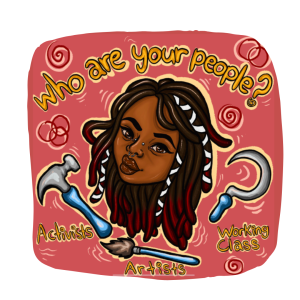The Lilith Blog 1 of 2
August 25, 2020 by admin
Black Jewish Women Artists You Should Know… Ayeola Omolara Kaplan
Art–whether it be dancing, painting, drawing, film–creates a space for self-examination, helping us to envision possible futures, and better versions of ourselves. And the Jewish month of Elul is traditionally an opportunity for introspection before the High Holidays of Rosh Hashanah and Yom Kippur.
Recognizing the power of art to be transformative, Lilith is highlighting Black Jewish women artists in this time leading up to and through Elul. On Lilith’s platforms you’ll have a chance to experience, share, and celebrate their work.
You can also participate by letting us know (at info@Lilith.org) Black Jewish women creators we should include!
—-
This week Lilith is featuring Ayeola Omolara Kaplan (@ayeolaomolara on Instagram).
Website: Ayeola.org
I am a queer, black, multimedia artist creating artworks that empower and educate the black diaspora and those interested in supporting our liberation. I create an empowering and electrifying visual experience through an exploration of identity, class, and spirituality. My artwork consists of paintings, drawings, and films that aim to energize people as well as challenge their current and past perceptions of reality.
To stress the spiritual aspects of my work, the pieces take up space in the gallery setting (Or your personal realms) not only as works of art but also as spiritual tools that I have created with the intention of amplifying the viewer’s inner voice. I want my work to inspire people and move them to pursue their dreams and a blissful collective future.

Who are your people?
I spent most of my life dreaming about the day I’d be surrounded by people who love and understand me. I’m happy to say that currently I find myself in that reality. I wake up each day feeling encouraged to keep on my path because there are many others who share my dreams for a just future. My people are working class people, artists, and everyone dedicated to the struggle for liberation.
What is the comfort food you’re making during the pandemic? 
So I’m not sure if it counts if I’m not making the food from scratch…but I’ve really been comforted by the bowls of instant tonkotsu ramen I’ve been making.
 What is something you need to say? To whom?
What is something you need to say? To whom?
A message I find most important to get out is that we need to fight harder for incarcerated folk. The movement for justice needs to not only include but also amplify the voices of incarcerated people, especially black incarcerated people. We can never be free while our family members are in cages. There is no healing behind bars.
I feel this is important for the American people to realize because the prison industrial complex is one of the greatest barriers on our path to bliss. Prisons hold captive political prisoners, people who need mental health care, education, support, and financial security. Prisons are the modern-day slavery system and they can only continue to profit off of black suffering as long as we allow them to.
Incarcerated people are our mothers, children, siblings, fathers, teachers, and partners. They need us to support them and build a society they can return to. We have to make sure that we aren’t just working to free people. We need to also work to dismantle the systems that lead to their incarceration and work with them to build systems that contribute to their healing, growth, and joy.
 Please wait...
Please wait...